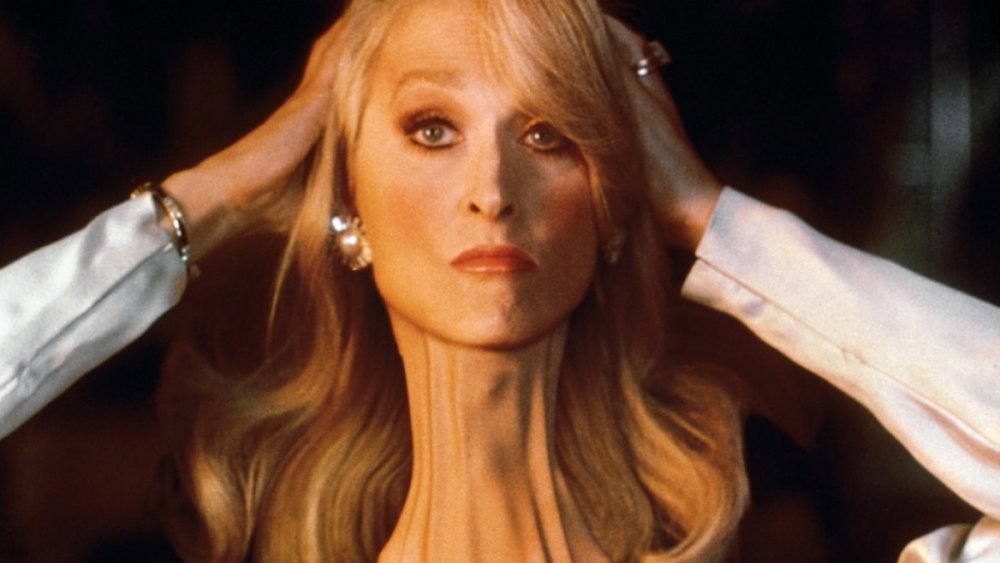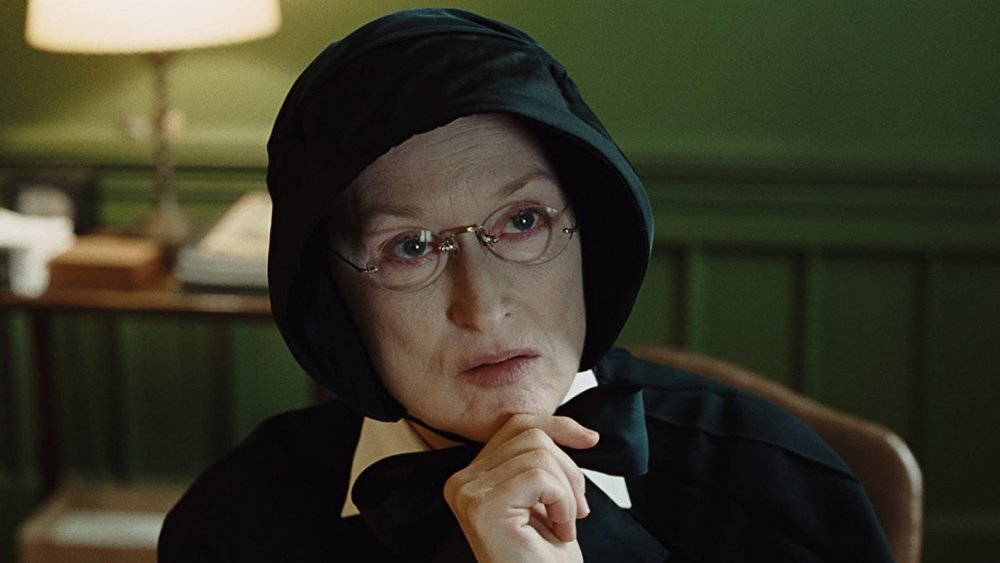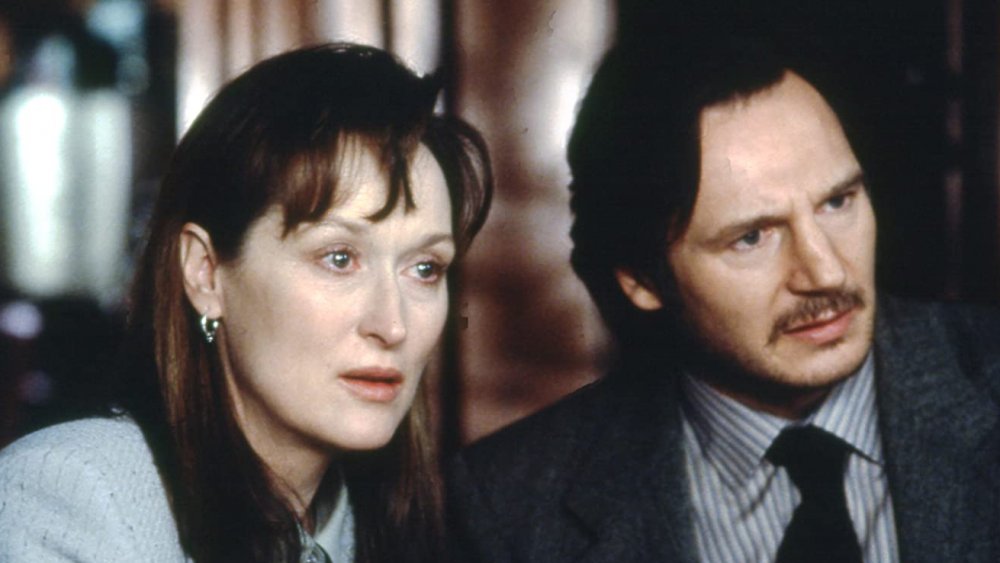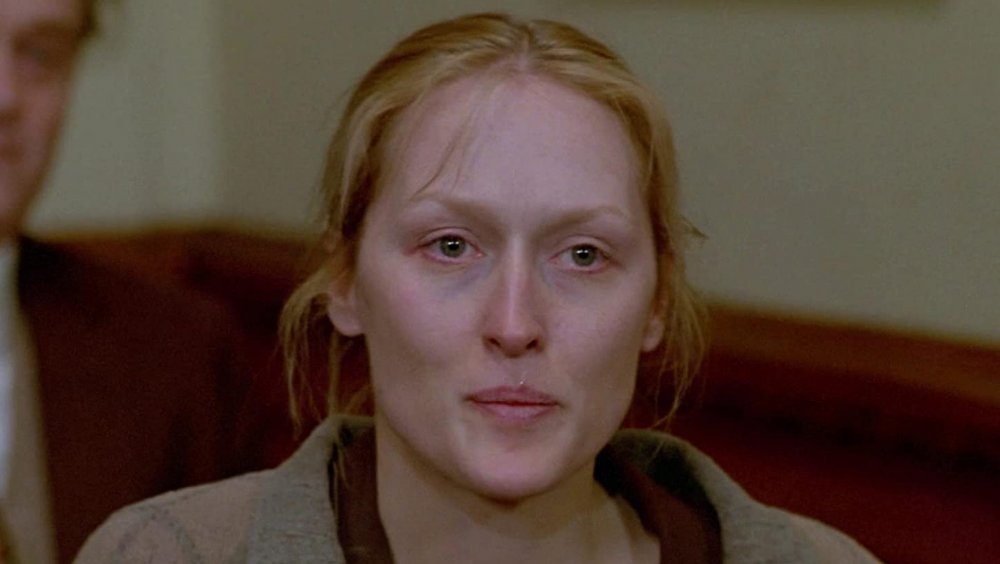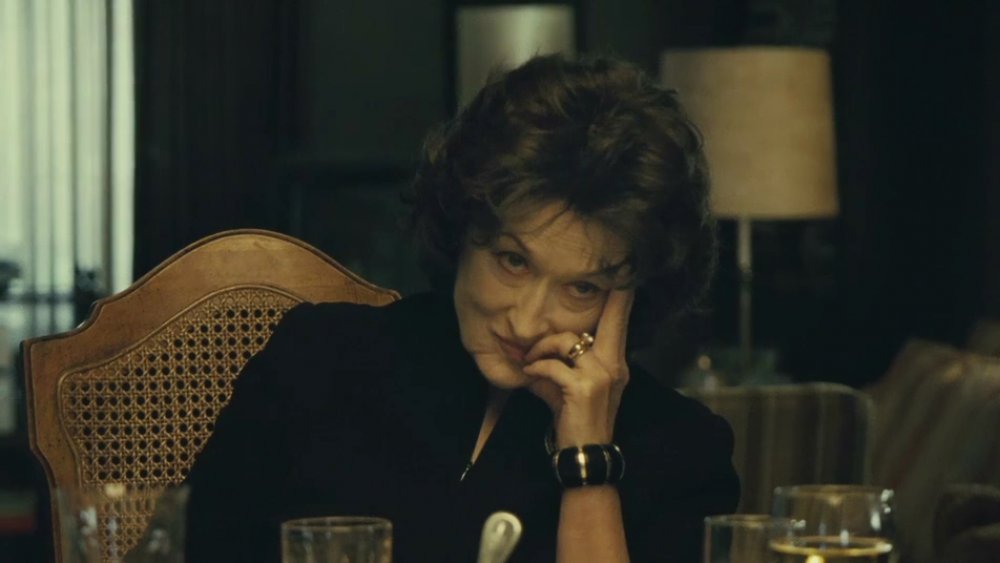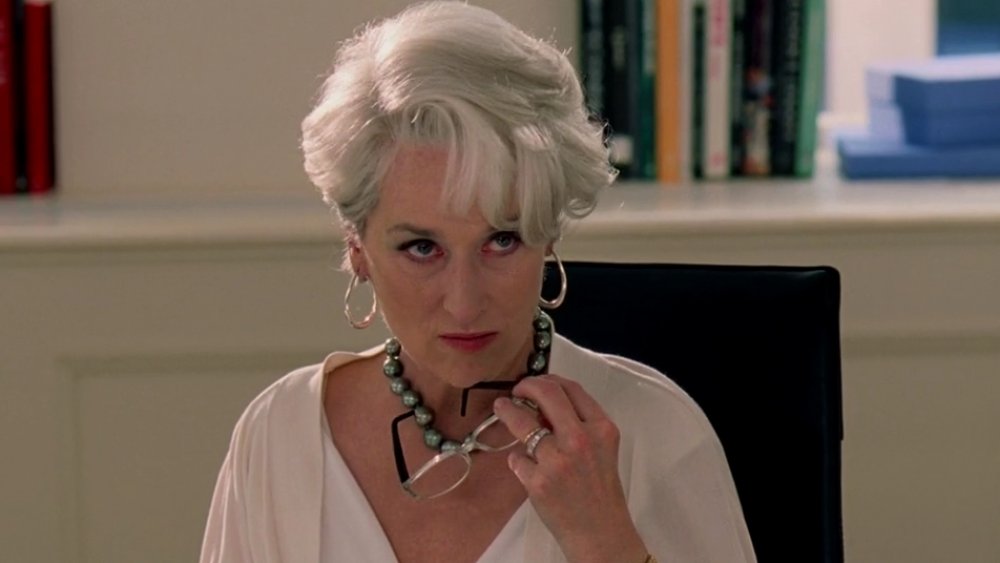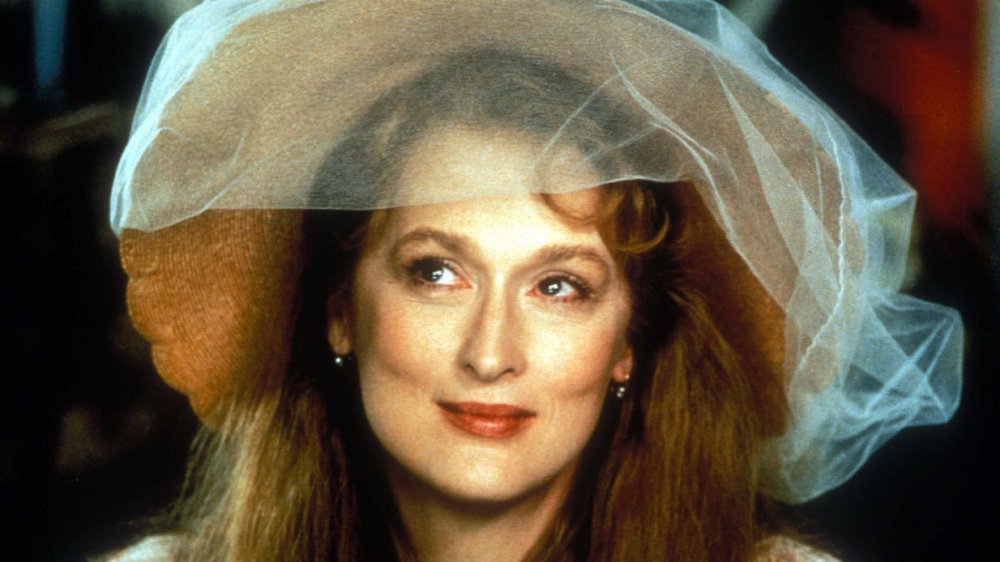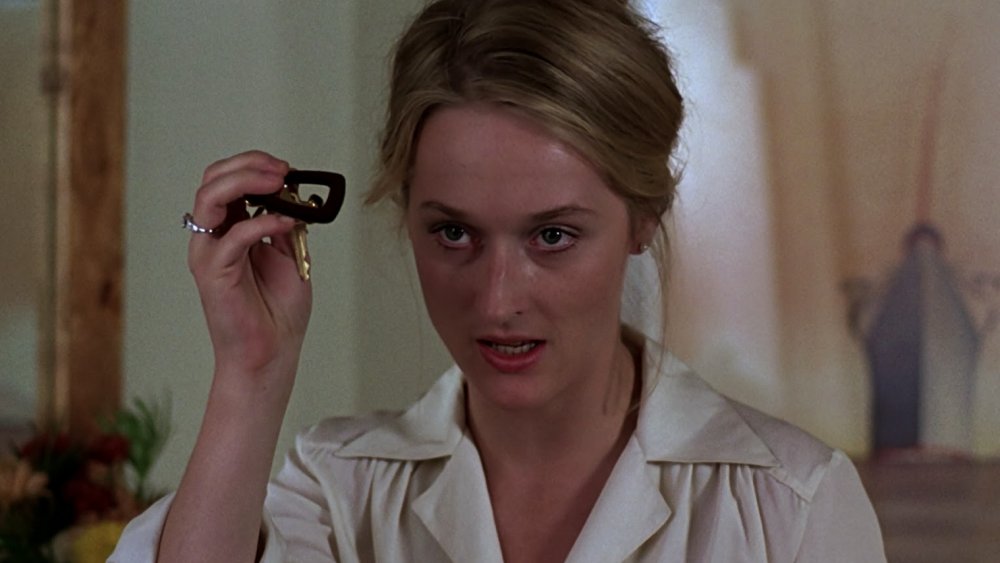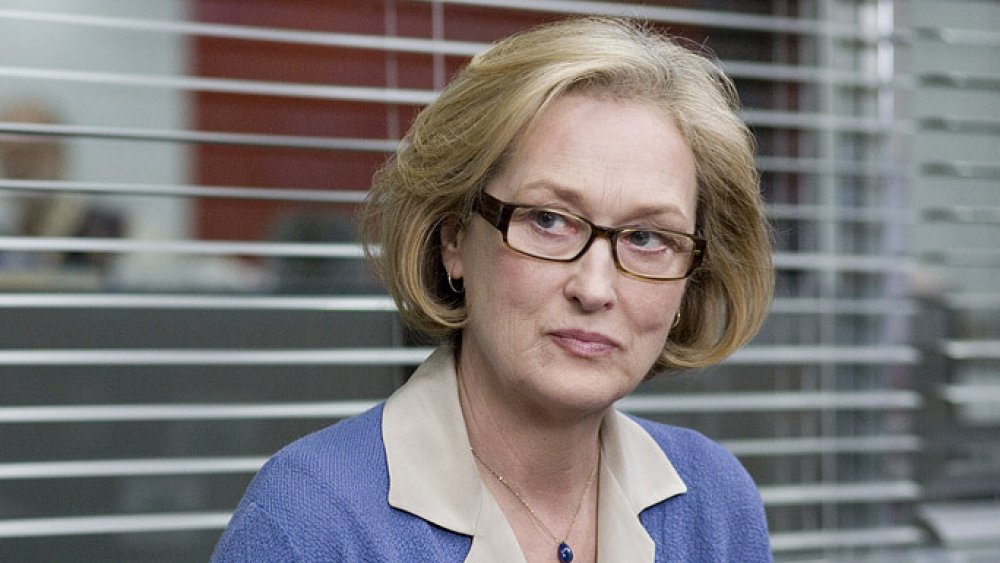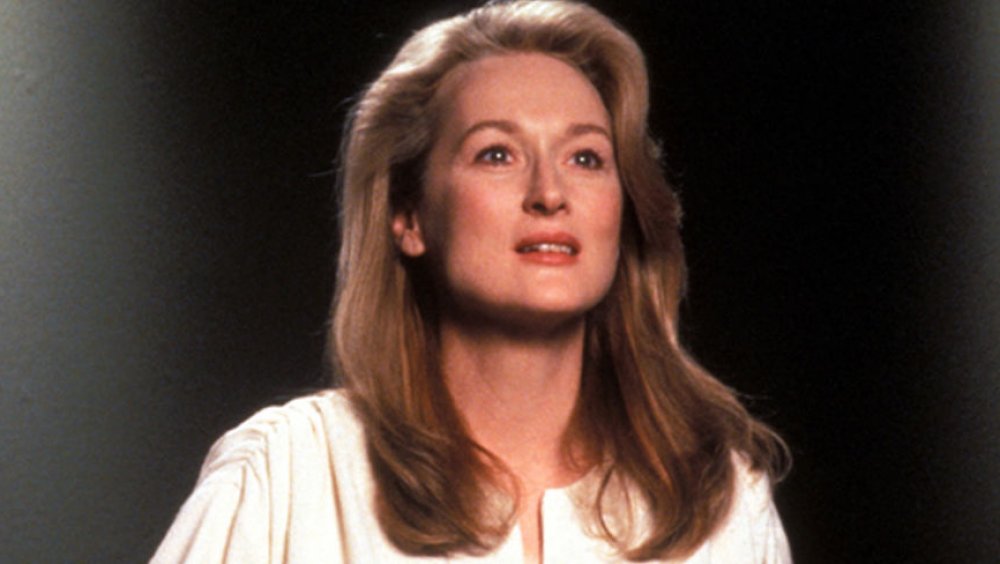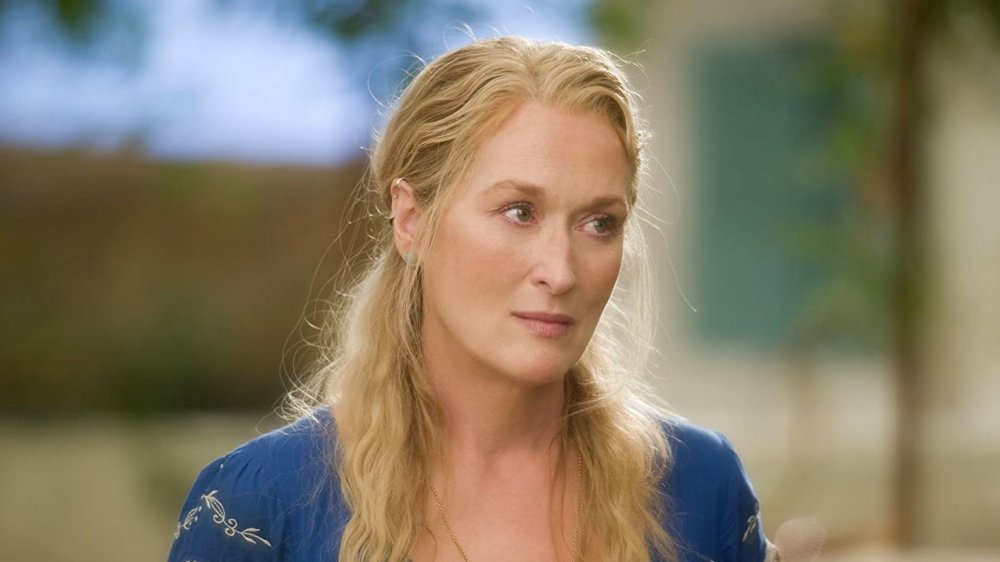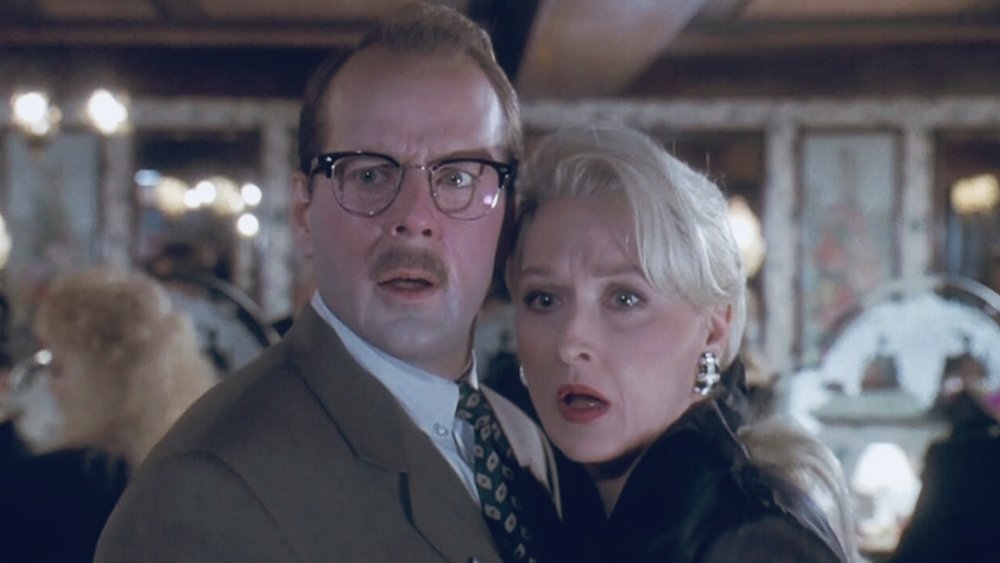Meryl Streep's Best And Worst Movie Performances
It would be tough to make the argument that there are many, if any, actors more talented than Meryl Streep. It seems like she's nominated for either a Lead Actress or Supporting Actress Oscar every single year — as of this writing, she's been nominated for 21 and won three. She's shown versatility and range with her roles, moving between deep introspection, brash enthusiasm, and everywhere in between.
Because of her skill, trying to choose Streep's best and worst performances is a tall order, although that certainly isn't going to stop us from trying. Something to keep in mind, however, is that there are far too many great Streep performances to include them all. (Don't forget the "21 Oscar nominations" thing.) At the same time, Streep's "worst" performances" are often still pretty darn good.
Without further ado, here are our picks for Meryl Streep's best and worst performances. We included an extra performance in the "best" column because we're talking about a living legend here.
Best: Doubt
It's a shame that Streep didn't win one of her three Academy Awards for 2008's Doubt. She can't win it every time out, of course. But her portrayal of Sister Aloysius, who worries that a boy in her Catholic school is being abused by Father Flynn, is easily one of the most nuanced and effective roles she's ever had.
Doubt is billed as a parable, meaning it's a simple story used to teach a lesson. What exactly that lesson is, however, is up for interpretation. One thing that isn't up for interpretation in Doubt is the strength of its leads. Besides Streep, the film features Philip Seymour Hoffman, Amy Adams, and Viola Davis. Considering the subject matter, this quartet has some serious heavy lifting to do.
Streep's Sister Aloysius is powerful, stern and utterly believable. Watching her, you are sure she's correct in her suspicions. As the story plays out, you begin to... well... doubt whether your assessment is correct. When the story comes to a close, will you still share her conviction? Will she? We don't want to give anything away here, but suffice it to say the role calls for — and gets — one of this talented actor's most finely layered performances.
Worst: Before and After
If there's one movie on this list you haven't heard of, we're guessing it's Before and After. It's from the mid-'90s, when Streep and co-star Liam Neeson were going through a bit of transition in their acting careers. Roger Ebert called Before and After "a long, slow slog," and there isn't really a better way to describe it. It's the type of movie where you'll sit through the whole thing, and just be relieved it's over when it finally reaches its (predictable) conclusion.
Streep and Neeson play a married couple who learn that their son is suspected of murdering his girlfriend. Streep's character, Carolyn, is convinced of her son's innocence, and wants to just let the truth play out. Neeson's Ben keeps making dumb decisions, however, eventually even convincing his son to lie about what actually happened.
Streep usually gives her all to every role, but she just seems off in this film. Whether that's a fault of her not connecting to the character or a problem with the script, you'll be just fine skipping Before and After.
Best: Sophie's Choice
Sophie's Choice is the movie that netted Streep her first Oscar win for Lead Actress (following an earlier win for Supporting Actress), and it isn't hard to see why. Streep's performance is extremely powerful and nuanced, and you can't help but feel for her character, the Polish immigrant Sophie. Her role in Sophie's Choice is impossible to forget once you've seen her story all the way through.
Sophie came to the United States seeking a better life after surviving Auschwitz in World War II. Her romantic entanglement with the unhinged Nathan (Kevin Kline, making his film debut) and, later, with thoughtful Stingo leads to plenty of complications. Sophie has obviously had a rough go of things but, when you learn the extent of what she had to go through, you'll realize there's a reason we still use the phrase "Sophie's Choice" when describing a decision with no positive outcome.
Streep was still near the beginning of her career in Sophie's Choice, but she brings power and maturity to a role when you might not expect it. Do not miss this one if you consider yourself a Meryl Streep fan.
Worst: August: Osage County
August: Osage County has all the makings of a special piece of cinema. It's based on a Pulitzer Prize-winning play. It screened at multiple film festivals. It has an absolutely loaded cast: besides Meryl Streep, you'll see Ewan McGregor, Julia Roberts, Abigail Breslin, Benedict Cumberbatch, Juliette Lewis, Chris Cooper, and plenty more. Streep and Roberts were both nominated for Oscars. So what gives?
Well, August: Osage County just never really gels. Maybe there were too many egos in the room, but it can often seem like the actors are working on entirely different movies. Streep plays an acid-tongued, pill-popping matriarch of a completely dysfunctional family, which sounds wonderful. In practice, Streep comes across like she's just playing Streep; her Violet Weston is pretty familiar territory for her at this point in her career.
In the IONCinema review for August: Osage County, Streep's role in the film is referred to as "the black hole that swallows all." While the film is fairly entertaining, it reads as far too campy and ridiculous for our liking, with Streep's Violet serving as ringleader.
Best: The Devil Wears Prada
Streep is one of the best in the game at delivering truly nasty characters, chewing the scenery and spitting acid with the best of them. There are few films where she does it as well as The Devil Wears Prada. What's really remarkable is that the film itself is not that great, but Streep's performance wills it along into the realm of enjoyable. Many of the reviews of The Devil Wears Prada, like one from The Guardian, have some sort of variation on "When Streep is absent from the screen... the interest factor plummets."
Streep plays Miranda Priestly, the head of Runway magazine and the world's most demanding boss. She takes pleasure in dressing down her staff, including newcomer Andy (Anne Hathaway). She's very calculating, though, and by the end of the film it seems she actually had purpose in acting the way she did.
The Devil Wears Prada is a satire without a lot of teeth, which usually falls flat, but Streep is just too damn good in it to ignore. Even if you aren't interested in fashion, you can't take your eyes off the screen whenever she's on it in this movie.
Worst: The House of Spirits
The House of Spirits features a great cast, great source material and a truly Oscars-worthy premise: a period drama focusing on the trials and tribulations of multiple generations of a family during a time of political unrest in Chile. Meryl Streep, Glenn Close, Jeremy Irons, Antonio Banderas, Winona Ryder... how could it possibly go wrong?
By shooting for "prestige," that's how. There are some films that you can just tell are shooting for awards and critical praise, and many of them succeed. When they don't, it can be painful. And The House of Spirits comes across more as drawn-out melodrama than successful arthouse cinema.
Streep plays Clara, a woman who grew up with psychic visions, but worries that her ability to see the future actually causes catastrophe. As such, she decides to stop speaking. All of this plays out over family drama during Chilean authoritarian rule, with much of the character-building falling back on melodrama.
Much of the negative response to The House of Spirits comes from how obvious it is that the film wants to be a prestige picture. Unfortunately, something is lost in translation from the excellent novel to the film, and it comes across as clichéd and boring instead.
Best: Kramer vs. Kramer
You know an actor is going to have a great career when her first major movie role partners her with Dustin Hoffman and nets her an Oscar. Streep has said that some of the tactics Hoffman employed during the filming of Kramer vs. Kramer, like a scene when he slaps her, were out of line, but you can't deny how strong the two are together onscreen.
Kramer vs. Kramer tells the story of a couple going through a divorce and their battle for custody of their child. Both of the main characters are totally flawed, but you can't help but sympathize with them and the decisions they make. It makes things even tougher to watch when they hit the courtroom and start assassinating one another's character. Streep's Joanna is vulnerable but on the attack — she knows why she left her husband and why she wants custody, and she will gladly muck around a bit to make it happen.
Kramer vs. Kramer cleaned up at the Oscars, and Streep's win as a supporting actress rather than a lead is a bit of a head-scratcher. It remains one of her strongest performances.
Worst: Lions for Lambs
Tom Cruise is a strange case. His early films are great, and he's still able to pull off thrilling action with the best of them. However, there are also a few stories of him micromanaging his films to the point of ruining them, and that may have been the case with Lions for Lambs. It was the first film under Cruise's personal production company, and underutilizing Streep's immense talent is just one of its crimes.
Streep plays a journalist who is essentially asked to serve as a government propagandist during the war in the Middle East. She is hesitant and tries to push back against both Cruise's Senator Irving and her editor, but to no avail. Eventually, her reporting helps to sell a controversial plan to the American public with terrible results.
The problem with Streep in Lions for Lambs is that she isn't really given the opportunity to do much. Cruise essentially monopolizes the scenes she is in, and her character, Janine Roth, really only gets one solid moment to strike back. It's a forgettable film in both Streep and Cruise's filmographies.
Best: Defending Your Life
Defending Your Life is often overlooked in Meryl Streep's impressive filmography, partially because she doesn't have too many scenes in it. Even still, it manages to be one of the best films she's ever worked in, and her performance as Julia could only work with Streep playing the part. Without her, the entire film could have fallen apart.
Defending Your Life is an Albert Brooks film about a man who is hit by a bus and transported to Judgment City — essentially purgatory — where the dead are given a chance to defend their choices in life in a last bid before they move on to the afterlife. Streep plays Julia, another soul awaiting judgment, and the two begin to fall in love even as it seems they may have different destinies.
Julia is one of Streep's best roles because of the tightrope she needs to walk. She's a saint of a character, practically perfect, and could be totally grating if played differently. Instead, you can't help but fall in love with her. It's a sentimental movie, but one you'll be glad you watched.
Worst: Mamma Mia!
It's hard to knock a Hollywood musical comedy set to the tune of ABBA's greatest hits, but Mamma Mia! is tough to defend beyond "It's fun!" Sure, a bunch of A-list stars singing along to ABBA makes for a fun bit of fluff, but it's just... not good. Streep delivers one of the better performances in this one (Pierce Brosnan's singing... woof), but there are way too many superior musicals and Streep movies out there to justify Mamma Mia!
There is a plot here, about a woman trying to figure out who her dad is by inviting a bunch of dudes her mom slept with to her wedding. Streep plays the mom in question, and she's certainly having fun as the hippie musician Donna. But there are just too many saccharine, mindless bits in Mamma Mia! to make it worth the watch.
The Guardian said of Mamma Mia! that "no film has ever had a more irrelevant story." You could argue that it's just a fun musical, but the same review also points out that "there is no sense of perspective on the music." Just do some ABBA karaoke and watch something different.
Best: Death Becomes Her
Death Becomes Her is not a fantastic film. It's pretty mean-spirited, it doesn't have a lot to say, and not all the comedy holds up. That said, there's a very good reason this film is beloved in so many circles: It boasts some absolutely fantastic performances. It's campy in all the best ways, and Streep's Madeline Menville leads the way.
Death Becomes Her is about two rivals, Streep's Madeline and Goldie Hawn's Helen, as they try to one up each other in society. Each is obsessed with staying young and maintaining their youth, leading to them taking some pretty drastic measures towards immortality. Bruce Willis and Isabella Rosellini, both excellent comedic actors in their own right, are along for the ride.
The film gradually devolves into a bizarre, frenemy situation where Helen and Madeline can't live with each other and (literally) can't kill each other, and they struggle to make the best of the absurd situation. Streep is at her vamping best in this one, and the ridiculousness continues to ramp all the way through to the final scene.
